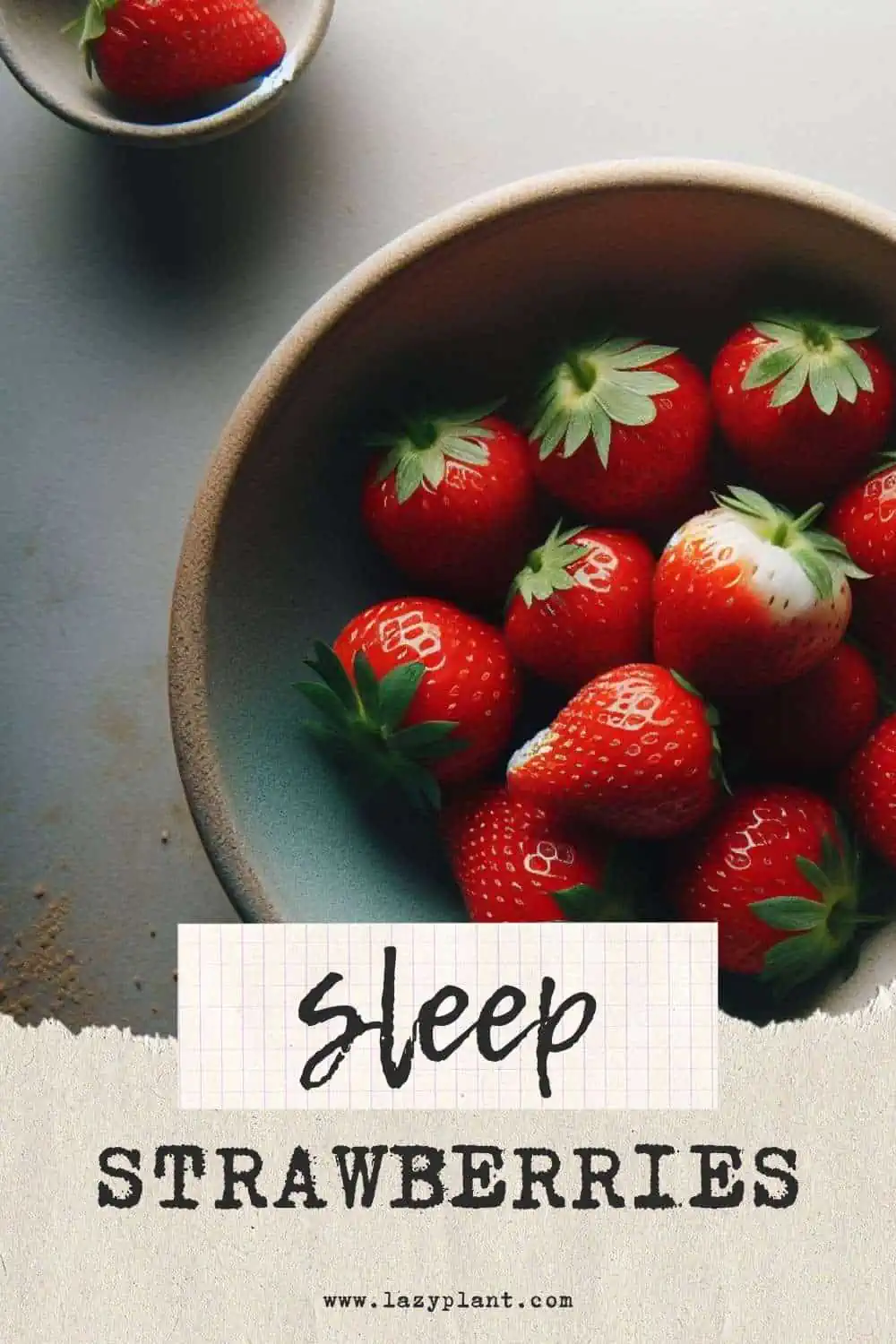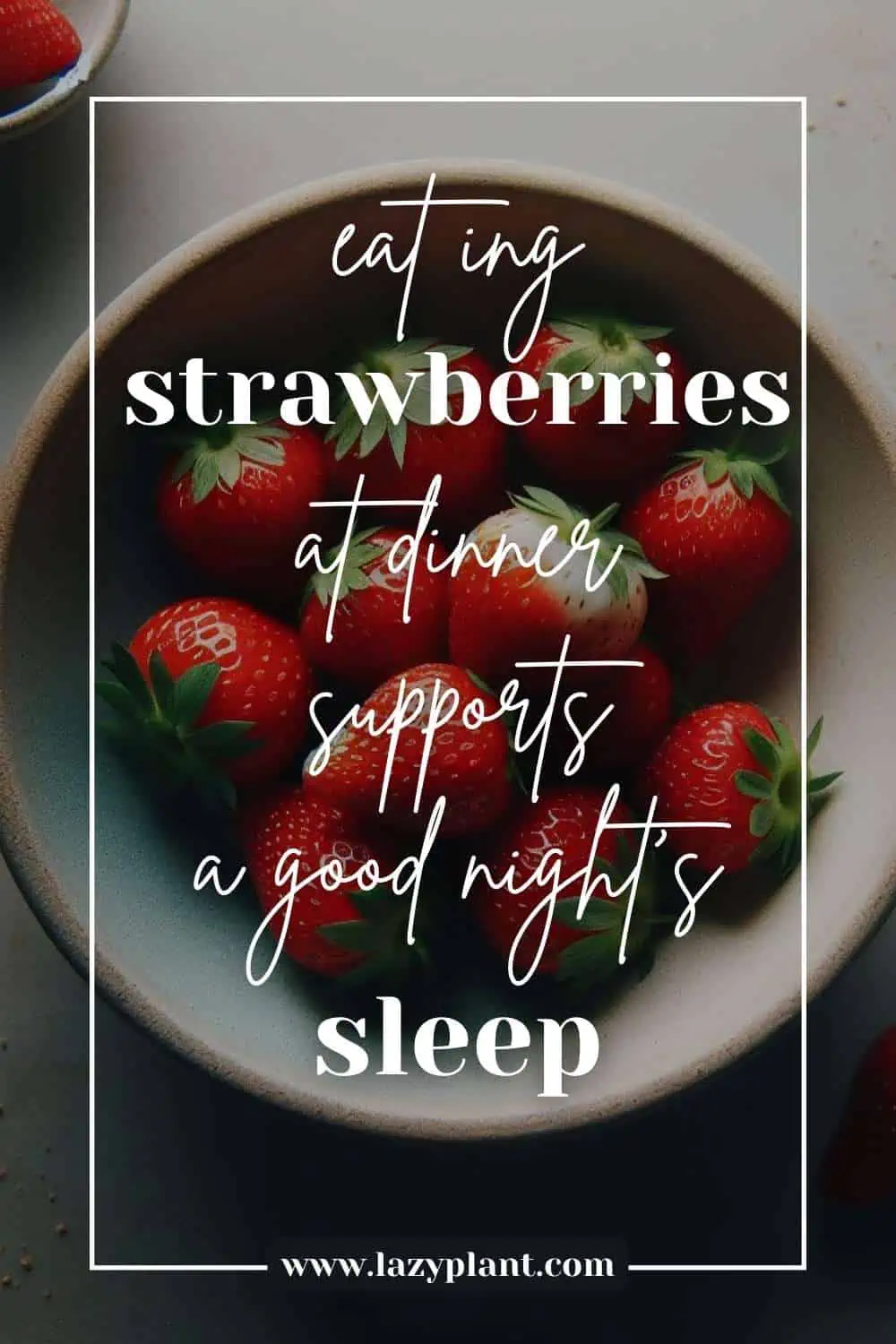Eating a cup of raw strawberries at dinner supports a good night’s sleep, weight loss, and good health. Anthocyanins, melatonin, vitamin C, and fiber have beneficial effects on sleep onset latency, duration, and quality. Many other compounds in strawberries indirectly help you sleep better at night.
Eating strawberries before bed aids in weight loss
Strawberries are a great late-night snack to satisfy your sweet tooth with a few calories. They support weight loss.
Promote satiety with only a few calories!
Eating fresh strawberries before bedtime is good for weight loss because they can keep you full until falling asleep.
They have a decent amount of fiber, which promotes satiety. It delays digestion and takes up a lot of volume in the stomach.
Additionally, raw strawberries are low in sugar and calories! Even people on keto and people with diabetes can consume reasonable amounts at dinner as a healthy sweet treat.
Raw strawberries have only 32 calories per 100g or 50 calories per cup! They’re among the healthiest foods you can eat every day for weight loss.[1]
Maintaining a healthy body weight for better sleep
Excess weight, particularly around the neck, can increase the risk of sleep apnea. This condition causes pauses in breathing during sleep, leading to fragmented sleep and daytime fatigue. Weight loss can significantly reduce sleep apnea symptoms and improve sleep quality.
Excess weight can restrict your airways, making breathing more difficult, especially when lying down. Weight loss can improve your breathing and promote deeper, more restful sleep.
Being overweight puts extra stress on your joints, which can lead to discomfort and pain that can disrupt sleep. Losing weight can alleviate this pressure and promote a more comfortable sleep.
Obesity can worsen heartburn and acid reflux, causing discomfort that can disrupt sleep. Weight loss can alleviate these issues and allow for a more peaceful night’s rest.
Regulation of Sleep Hormones:
- Leptin is a hormone that signals satiety (feeling full). Weight loss can improve your body’s sensitivity to leptin, which can help regulate your sleep-wake cycle and promote better sleep.
- Ghrelin is a hormone that stimulates hunger. Obesity can lead to chronically elevated ghrelin levels, disrupting sleep patterns due to hunger pangs. Weight loss can help normalize ghrelin levels and promote better sleep.
Weight loss should be approached in a healthy and sustainable way.
Eating strawberries at dinner supports a good night’s sleep!
Hydration
Furthermore, strawberries hydrate the body. Fresh strawberries are 91% water. A cup provides about 150 ml of water, which is 7.5% of the minimum recommended daily intake of water.
Moreover, strawberries as all fruits are natural water filters. They contain high-quality purified water. In addition, they hydrate better than tap water because they also provide electrolytes, which we have to replenish daily.
Proper hydration plays a significant role in promoting good sleep quality.
Regulation of Body Temperature: During sleep, your body temperature naturally dips slightly. Proper hydration ensures your body functions efficiently to maintain this optimal sleep temperature. Dehydration can disrupt this process, making it harder to fall asleep and stay asleep comfortably.
Brain Function: The brain is heavily reliant on water for optimal functioning. Dehydration can lead to decreased alertness, impaired cognitive function, and difficulty concentrating, all of which can negatively impact sleep quality.

Blood Volume and Circulation: Dehydration can lead to a decrease in blood volume, which can put stress on the heart and make it harder to circulate blood effectively. This can lead to feelings of restlessness and disrupt sleep.
Waste Product Removal: During sleep, your body continues to remove waste products. Adequate hydration helps your kidneys function properly and eliminate these wastes efficiently, promoting a more restful sleep.
Consequences of Dehydration
Dehydration can contribute to headaches, which can be disruptive and make it difficult to fall asleep or stay asleep.
When dehydrated, you might experience more frequent awakenings during the night, leading to fragmented sleep.
Dehydration can increase the risk of muscle cramps, which can be very uncomfortable and disrupt sleep.
Additionally, dehydration can contribute to stress hormones like cortisol. Staying hydrated can help regulate these hormones and promote a more relaxed state for better sleep.
While good hydration is crucial for sleep quality, overhydration right before bed can lead to excessive bathroom trips and disrupt sleep. Finding the right balance is key.
Insufficient sleep linked to increased risk of dehydration in adults compared to 8 hours of sleep.[2]
By staying properly hydrated, you can create a more optimal environment for restful and restorative sleep.
Vitamin C
Strawberries are among the richest foods in vitamin C. A cup provides almost 100% of the Daily Value! Adequate vitamin C intake has beneficial effects on sleep quality. It plays a role in daytime sleepiness, restless legs syndrome, sleep apnea, and insomnia!
Anthocyanins
You could also eat a cup of strawberries as a healthy snack one hour before dinner.
Glycemic Control
Strawberries are packed with powerful phytochemicals like anthocyanins, which have a beneficial role in glycemic control. Strawberries regulate postprandial insulin responses.[3]
Low glycemic index (GI) foods are digested and absorbed slowly, leading to a more gradual rise and fall in blood sugar levels compared to high GI foods. This stability can contribute to better sleep. Raw strawberries have a pretty low glycemic index of 40.
Regularly consuming low GI meals can improve your body’s sensitivity to insulin, the hormone that regulates blood sugar. This can further promote stable blood sugar levels and potentially better sleep.

Sudden drops in blood sugar can trigger the release of stress hormones like cortisol, which can interfere with melatonin production. Melatonin is a hormone crucial for regulating sleep-wake cycles. Low GI meals help maintain stable blood sugar, potentially promoting melatonin production and better sleep!
Low GI foods are often high in fiber, which can promote healthy digestion and reduce discomfort that might disrupt sleep.
Moreover, low GI foods tend to keep you feeling fuller for longer, potentially reducing the urge to snack late at night, which can disrupt sleep.
Antioxidant & anti-inflammatory properties
Anthocyanins possess anti-inflammatory properties. Chronic inflammation has been linked to sleep disturbances. Consuming anthocyanins might offer some benefits, but more research is needed.
Antioxidants can help combat oxidative stress, which can disrupt sleep patterns.
Some studies suggest anthocyanins might improve cognitive function and memory. Better cognitive function can indirectly promote relaxation and prepare the mind for sleep.
Also, anthocyanin in strawberries has neuroprotective properties. Their consumption is beneficial for people with insomnia because they may play a role in treating anxiety and depression.[4]
Strawberries contain quercetin, another phytochemical with potential antioxidant and anti-inflammatory benefits that might indirectly contribute to better sleep.
According to studies, people who consume more servings of fruits and vegetables a day have better sleep quality and shorter time to fall asleep than people who consume lower amounts.[5]
Melatonin
Above all, strawberries support a good night’s sleep because they’re among the richest foods in melatonin. Melatonin is a sleep hormone. It’s the internal clock of the body. It regulates sleeping patterns.
Melatonin is a natural hormone produced by the pineal gland in the brain. It plays a crucial role in regulating your sleep-wake cycle (circadian rhythm). Melatonin levels rise in the darkness and decrease in the presence of light, signaling to your body that it’s time for sleep.
Studies suggest melatonin can shorten the time it takes to fall asleep by a few minutes. It might improve overall sleep quality in some individuals, leading to more restful sleep.
Melatonin can help regulate your circadian rhythm, promoting a more consistent sleep schedule.
The amount of melatonin in strawberries is very low compared to melatonin supplements. Melatonin supplements might help you fall asleep faster, especially for people with jet lag, shift work sleep disorder, or delayed sleep phase syndrome (difficulty falling asleep at night).
You can find melatonin supplements under $5 on iHerb.
Fiber
In addition, strawberries could improve sleep quality because they’re high in fiber. A serving provides 9% DV. Diets high in fiber have been associated with restorative sleep with fewer arousals.[6]
Fiber acts as a prebiotic, feeding the good bacteria in your gut microbiome. A healthy gut microbiome is linked to better overall health, which can indirectly improve sleep quality. A balanced gut microbiome might play a role in regulating hormones that impact sleep, like cortisol and melatonin.
Also, fiber intake might help reduce inflammation in the body. Chronic inflammation has been associated with sleep disturbances.
Furthermore, fiber helps regulate blood sugar levels by slowing down the absorption of carbs. This stability can contribute to better sleep compared to blood sugar spikes and crashes caused by high-glycemic foods. It can keep you feeling fuller for longer, potentially reducing the urge to snack late at night, which can disrupt sleep.
Manganese
Strawberries are also among the richest foods in manganese. A cup, which is a typical serving (about 8 strawberries) provides 25% DV.
Manganese is a cofactor for several enzymes involved in various functions of the body, including energy production and metabolism. These functions can indirectly influence sleep quality.
This essential mineral might play a role in the production of certain neurotransmitters, including dopamine and serotonin, which can influence mood and relaxation, potentially impacting sleep quality.
Additionally, manganese has antioxidant properties that can help combat oxidative stress, which can disrupt sleep patterns.
While not directly related to sleep, adequate manganese intake is crucial for bone health. Discomfort from bone issues can disrupt sleep, so maintaining good bone health might contribute to better sleep indirectly.
Manganese deficiency is uncommon in developed countries with access to a varied diet. It’s naturally found in various foods, including nuts, seeds, whole grains, legumes, leafy green vegetables, and some fruits. A balanced diet typically provides sufficient manganese for most people.
While maintaining adequate manganese levels might contribute to overall health and potentially offer some indirect benefits for sleep, it’s not a guaranteed solution for sleep problems.
Folate
Folate in strawberries (9% DV per serving) is involved in the production of important neurotransmitters like serotonin, which regulates mood, sleep-wake cycles, and feelings of well-being. Deficiency might contribute to sleep disturbances.
Folate helps break down homocysteine, an amino acid. Elevated homocysteine levels have been linked to sleep problems in some studies. Folate sufficiency may help maintain healthy homocysteine levels and potentially improve sleep quality.[7,8]
Folate is essential for various cellular functions, including energy production. Deficiency can lead to fatigue and a lack of energy, which might indirectly impact sleep quality.
Folate is crucial for overall health, and maintaining adequate levels can contribute to well-being, which can indirectly promote better sleep.
People with folate deficiency might experience sleep disturbances along with other symptoms like fatigue and anemia. Addressing the deficiency through diet or supplements might improve sleep quality.
Folate is especially important during pregnancy and lactation. Ensuring adequate intake can benefit both the mother and the baby’s health, which can indirectly improve sleep patterns.
Folate is naturally found in various foods like leafy green vegetables, lentils, beans, nuts, and fortified grains.
Additional Tips for Better Sleep
- Regular Sleep Schedule: Go to bed and wake up around the same time each day, even on weekends, to regulate your body’s natural sleep-wake cycle.
- Relaxing Bedtime Routine: Develop a calming bedtime routine that helps you wind down before sleep. This might include taking a warm bath, reading a book, or practicing relaxation techniques like deep breathing or meditation.
- Create a Sleep-Conducive Environment: Ensure your bedroom is dark, quiet, cool, and clutter-free to promote better sleep quality.
- Limit Screen Time Before Bed: The blue light emitted from electronic devices can suppress melatonin production, a hormone that regulates sleep. Avoid screens for at least an hour before bedtime.
- Regular Exercise: Engage in regular physical activity, but avoid strenuous exercise too close to bedtime.
How many strawberries could I eat before bed?
Most people could eat a cup of raw strawberries before bed. As strawberries have a few calories and they’re low in sugar, healthy people could even eat two cups at dinner.
However, you could enjoy strawberries as part of a healthy breakfast, snack, or dessert earlier in the day to avoid any potential bedtime disruptions. There is no need to eat them close to bedtime for better sleep.
While strawberries have a low glycemic index, they still contain sugar. Be mindful of this if you have blood sugar regulation concerns.
Strawberries are a good source of fiber, which can be beneficial for digestion but might cause discomfort in some people if consumed in excess before bed.
Combine strawberries with yogurt, cottage cheese, or a small amount of granola for a balanced and satisfying dinner snack.
When do Strawberries disrupt Sleep?
Consuming added sugar at dinner can potentially disrupt your sleep quality.
Added sugar in sugary drinks, desserts, or processed foods can cause a rapid rise in blood sugar levels followed by a crash. This roller coaster effect can disrupt your sleep. The blood sugar crash can trigger the release of stress hormones like cortisol, which can make it harder to fall asleep and stay asleep.
Blood sugar fluctuations can lead to feelings of restlessness and wakefulness during the night.
Moreover, large amounts of sugar at dinner, especially processed sugars, can slow down digestion and lead to bloating, gas, or heartburn, making it uncomfortable to fall asleep.

Sugary meals might not be as filling as balanced options. You might experience hunger pangs later in the evening, leading you to snack and potentially disrupting sleep.
Consuming excessive added sugar contributes to increased calorie intake, which can lead to weight gain over time. Obesity is a risk factor for sleep apnea, a condition that disrupts sleep quality.
Strawberry products packed with Sugar to Avoid before bed
Strawberry Syrup: This classic topping for pancakes, waffles, and ice cream is loaded with added sugar for sweetness and often contains artificial flavors and colors.
Strawberry Ice Cream: While some brands might offer options with lower sugar content, commercially produced strawberry ice cream typically boasts a significant amount of added sugar to achieve its sweetness and creamy texture.
Strawberry Yogurt: While yogurt itself can be a healthy choice, flavored yogurts, especially those with fruit on the bottom, often contain high amounts of added sugar to enhance the fruit flavor.
Strawberry Jam: Jams and preserves are concentrated fruit spreads, and sugar is often added to achieve the desired consistency and sweetness.
Strawberry Milk: While it might seem like a healthy alternative to plain milk, commercially produced strawberry milk is often flavored with artificial sweeteners and added sugars. I occasionally drink strawberry-flavored kefir, as kefir supports gut health, a good night’s sleep, and weight loss. It’s the healthiest dairy product!
Strawberry-Filled Pastries: Pastries like donuts, danishes, or croissants with strawberry fillings typically have a high sugar content in both the filling and the pastry itself.
Strawberry-Flavored Energy Drinks: These drinks might be marketed for a healthy energy boost, but they often contain large amounts of added sugar alongside artificial flavors and stimulants.
Strawberry-Flavored Candies: Gummy candies, sour candies, and hard candies with strawberry flavoring are primarily sugar-based, offering minimal nutritional value.
Strawberry-Flavored Protein Bars: While protein bars can be a healthy option, some varieties with strawberry flavoring might contain added sugars and sugar alcohols for taste and texture.
How to eat strawberries before bed for better Sleep?
You could eat a peanut butter and jelly sandwich before bed. But, you should prepare it with a high-quality, sugar-free strawberry jam. A PB&J sandwich supports a good night’s sleep because it’s packed with tryptophan and many minerals that relax the muscles and relieve joint pain.
Tryptophan is an amino acid which is the precursor of serotonin! Serotonin is a neurotransmitter that plays a key role in sleep and weight loss.

Moreover, you could eat raw strawberries with meals high in protein, such as Greek yogurt or protein shakes. Diets higher in protein have been associated with better sleep quality.[7]
Also, you could eat strawberries with other berries. For instance, raspberries are packed with nutrients, which promote weight loss and a good night’s sleep.
On the other hand, you should avoid eating strawberries before bed with foods high in saturated fat, such as butter, cheese, fatty meat, coconut, or palm oil. High intake of saturated fat at dinner has been linked to lighter, less restorative sleep with more arousals!
Many highly processed packaged products as well as fast food are particularly high in saturated fat. You should avoid consuming them at dinner.
What’s the best time of the day to eat strawberries?
We can eat strawberries any time of the day. But, the best times to eat them for weight loss are at breakfast, before a high-calorie meal, or after exercise! They hydrate the body and reduce cravings for fattening foods with a few calories.